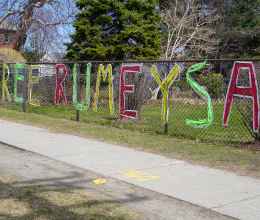
Advocates, educators, and parents are testifying today in support of a legislative proposal to ensure that Massachusetts libraries can continue to offer diverse and inclusive books and materials. As a vocal minority seeks to ban books in schools and libraries nationwide, the ACLU of Massachusetts, GLBTQ Legal Advocates & Defenders (GLAD), Jewish Alliance for Law & Social Action (JALSA), MassEquality, librarians, and more call for the passage of An Act regarding free expression (S.2528/H.4229).
Sponsored by Senator Julian Cyr and Representative John Moran, S.2528/H.4229 would make clear that students’ free expression rights include the right to access library materials selected by school librarians and professional educators without external political interference.
“As home to the nation’s first public library and first public school, Massachusetts has long appreciated that unabridged access to knowledge is key to opportunity and fulfillment,” said Senator Julian Cyr. “At this sad moment when hate and fear are driving too many cruel and bigoted policies across the nation, and yes closer to home, we must reject hateful attempts to censor the richness of the human experience captured on the shelves of our libraries. I am grateful to Representative John Moran for his partnership in ensuring no one in Massachusetts is barred from exploring books and materials. We cannot allow small-minded bans or politically opportunistic censorship interfere with the right to read.”
“I am thrilled to partner with Senator Julian Cyr on this important legislation,” said Representative John Moran. “As a member of the LGBTQ+ community representing a highly diverse district, I understand how important it is to prevent unnecessary censorship of books and other library resources. This bill would help ensure access to age-appropriate materials for communities across the state, with content decision making maintained by trained professionals.”
From calls for book bans to curriculum censorship, advocates have decried a coordinated, nationwide attack on students’ right to learn, noting that Massachusetts is not immune. In December, police in Great Barrington searched a middle school classroom in response to an anonymous complaint about a book, prompting a letter from the ACLU and GLAD. Both organizations previously urged school districts to protect students’ legal rights by rejecting calls to remove library books.
“Politically motivated censorship has no place in our Commonwealth,” said Carol Rose, Executive Director at the ACLU of Massachusetts. “Students have a right not just to express themselves, but to learn from a diverse range of materials — including library books by and about LGBTQ and BIPOC communities. We commend librarians and school officials for rejecting these censorship campaigns and we thank Senator Julian Cyr and Representative John Moran for their leadership on this issue.”
“Libraries with books and characters that portray the range of people in the school community help students to both see themselves and learn about others. Students’ abilities to navigate the world improve when there is a culture of respect, openness, and tolerance — when that is denied, students miss out and learning suffers,” said Mary Bonauto, Senior Director of Civil Rights and Legal Strategies at GLAD. “We’re grateful to the librarians, school officials, parents, and community members who have stood strong against restrictions on learning and politicized efforts to ban books centered on people of color and LGBTQ+ people, and we thank Senator Cyr and Representative Moran for introducing this legislation to say we will not let this happen in Massachusetts.”
“Personally, I am horrified that today, in 2024, I have to be testifying in front of a state legislative committee in the United States of America in defense of the right of people to read books,” said Cindy Rowe, President and CEO of JALSA. “Book bans are tactics designed to control what ideas people can be exposed to, warping our perception of the world around us. Further, book bans are attempts to control our understanding of history in order to whitewash it. Efforts to combat book banning, like this legislation, are how we stand up to authoritarians, white nationalists, and others who would use division as a political tactic to keep us from coming together in a thriving democracy rooted in equity, empathy, and opportunity for all.”
“The attempts to ban books across the Commonwealth and across our nation are attacks on marginalized communities,” said Tanya Neslusan, Executive Director of MassEquality. “The inclusion of diverse reading materials in school libraries is critical for students who need to see their identities represented in these pages. It is equally important for the students who are not members of these communities to engage with this material so they can understand and learn to accept different identities. This bill will put decisions in the capable hands of professional librarians rather than those pursuing a discriminatory political agenda.”
“Queer students and students from LGBTQ families should not be denied access to books in school just because someone else’s parents don’t approve of our families,” said Arline Isaacson, Co-Chair of the Massachusetts GLBTQ Political Caucus. “How dare those parents try to deprive our children the ability to access library books about themselves or our families.”
S.2528/H.4229 would ensure that decisions about book selection or removal are based on educators’ professional training and not personal, partisan, or doctrinal beliefs. In addition, the bill would establish clear standards by which any book removal requests must be judged to ensure that appropriate materials are not removed.
“The current climate around intellectual freedom makes it challenging for librarians to fulfill our responsibility to our students,” said Jennifer Varney of the Massachusetts School Library Association. “At best, librarians are subject to hostile questions. At worst, librarians are being vilified, harassed, and doxxed. Some are choosing to leave the profession altogether. A successful democracy relies on an educated population. Massachusetts legislators can help school librarians protect the rights of students by passing these bills, so that we can serve our students without fear of discipline, repercussions, or harassment.”
“Parents have a voice in public education. A parents’ right to opt their child out of curricula or library materials already exists,” said Andrea Fiorillo of the Massachusetts Library Association. “However, when parents, or the activists claiming to speak on their behalf, attempt to deny access to everyone’s children, whose parental rights are being served? This is not parental control; it is authoritarian control.”
For more information about the ACLU of Massachusetts’ Free Expression Project, go to: https://www.aclum.org/en/free-expression-project


